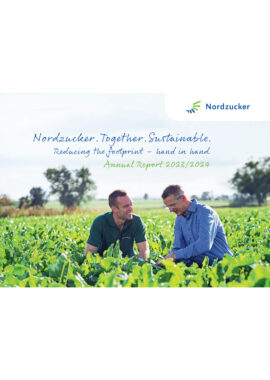
Nordzucker Post 3/2023 - 27 July 2023
News from Brussels
RED III – now national implementation is crucial
Nordzucker wants to achieve climate-neutral production by 2050 at the latest. Renewable energy from beet pulp, which is a residual material from sugar production, plays an important role in this. In the so-called trialogue on the amendment of RED III at EU level, the Commission, the Council and the Parliament agreed to consider such residues as climate-neutral.
The use of about half of the beet pulp for biogas production can enable Nordzucker to cover its future energy needs. After the important first step in Brussels, it is now important that the directive is published and transposed into national law. And the classification of beet pulp as a residual material, which is now necessary at national level, must be examined for each site in the further procedure. In any case, beet pulp will still be available as animal feed for the market in the future.
SUR – against a blanket ban on plant protection products!
The discussion about the EU’s plans for a regulation on the sustainable use of plant protection products (SUR) is intensifying. On 11 September, the Environment Committee in the European Parliament will vote on the plans before the plenary of the EU Parliament deals with the proposal on 2 October. The plan is to reduce the use of chemical plant protection products by 50 percent by 2030, which is to be achieved, among other things, through a blanket ban on their use in so-called “sensitive areas”. Restrictions on plant protection have always been excluded in the designation of protected areas, some of which are decades old. The extent of these areas also varies greatly across the EU. While in some countries they are only small in extent, in Germany there are countless landscape, nature conservation and bird protection areas etc.. The definition of “sensitive areas” for the purposes of the SUR, which has not yet been finalised, is of great importance.
Affected by the SUR are all forms of land cultivation, arable crops, fruit, vegetables, viticulture and thus also beet cultivation, which still depends on plant protection.
As part of our Smart Beet Initiative, we at Nordzucker are working intensively on new ways of growing beet with less use of chemical pesticides, sustainable promotion of soil fertility, mechanical-digital methods of plant protection such as the use of robot technology and natural pest control by ladybirds, for example.
It takes time to move from trial results to practical maturity. Large-scale and high-yielding beet cultivation will therefore not be able to manage without plant protection for the time being. If the EU plans are implemented in the short term, beet cultivation will not be possible in the areas affected by the ban. Maintaining competitive beet cultivation secures the raw material for the sugar factories and thus contributes to the security of supply of the population with a regionally produced foodstuff. It is our task to work together with our beet growers to raise awareness of this and to argue strongly – also at the political level – for the safeguarding of beet cultivation.


